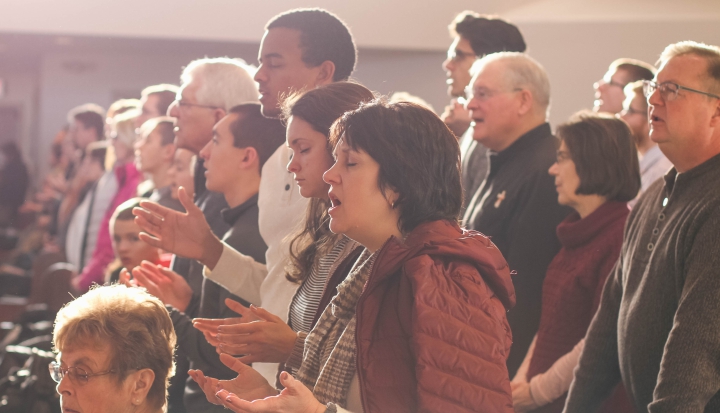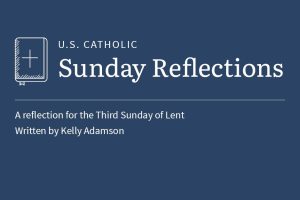“I feel a little like fresh meat,” my husband, Matt, whispered to me.
We’d just walked into the crowded church hall, where the congregation’s annual benefit auction was going on. When we joined the church a few months earlier, we thought the auction might be a good way to both meet new people and financially support our new church. Matt had persuaded me that we should offer to host a murder mystery dinner party as one of the auction items, and we came prepared to bid on items ranging from a 6-month beer subscription at a local brewery to dog obedience lessons. It seemed like an event that was right up our alley.
But as soon as we walked in we immediately felt out of place.
The problem wasn’t that people weren’t friendly or welcoming to us, the obvious newcomers. People immediately came up to us to make conversation, invited us to sit at their table, and thanked us profusely for donating our time and energy to an auction item. But we were by far the youngest people in the room, with the exception of a couple small children playing in the corner. The average age was probably closer to 60 than 30—our age. And in a gathering where the majority of people had been members for decades, we stuck out both because of our age and because of our newness.
We quickly found that to be a trend. We tried to participate in the religious education program but found the group to be mostly retired professionals. We were also always sliding in 15 minutes late: The class met just a little too early on a Tuesday night for it to be easy to get to after work. I volunteered as a greeter and met some other volunteers who introduced me to their friends in the congregation, all of whom were in their 50s or 60s. We went to the church’s annual Christmas potluck and found everyone close to our age was too distracted chasing around their young children to have time to chat and that people who did start conversations were, again, significantly older than we are.
A recent Pew study found that only 31 percent of American Catholic older Millennials—my age bracket—attend church services once a week, while 48 percent attend somewhere between twice a month and a few times a year. That same Pew study found that 65 percent of American Catholic Millennials seldom or never participate in any prayer service, Bible study, or religious education. Only 14 percent do so at least once a week.
Attending weekly Mass is important, and corporate worship and the Eucharist are vital parts of the Catholic faith. But belonging to a church community is about so much more. How are young people supposed to have a voice in their churches if they are, at best, merely showing up for an hour every week and then slipping out the door before coffee hour?
Growing up, I was taught that church isn’t just about Sunday services. Part of being a parishioner is donating both your time and money to the parish community. My dad played the guitar every week at Mass, while my mom ran the parish nursery, managed the parish library, and taught religious ed. I was an altar server throughout high school, and in college I was the music minister for my campus Newman group. I ran a centering prayer group and helped host late-night movie screenings, bowling trips, and dance parties.
But after graduation I went looking for the vibrant community I had as a college student and the feeling of belonging I had as a child growing up in the local parish, and I failed to find it. So, like many other young adults, I stopped going to church altogether for several years—until last year when Matt and I joined this new community.
Parishes recognize the age gap in regular membership and have long been working to get young people more involved. They host Theology on Tap, young adult fellowship groups, speakers, and film series. But none of these intentionally young adult activities appeal to me, and I’m starting to think that they’re not the answer. Rather than a church hosting events specifically for young adults, young adults should be encouraged to engage in different ministries and fellowship within the intergenerational life of a parish.
Instead of thinking of the church’s various ministries as a social club or way to make friends, I’ve started thinking of it more as a family. When I go to my family’s reunions my siblings and I are the only people in our age bracket: All of my cousins are much older than I am, and the next generation—my cousins’ children—are much younger. But rather than sitting at home or slipping away at the earliest opportunity because no one is my age, I celebrate the opportunity to be around these people to whom I am connected. The things we have in common—our faith, our family—give us roots and allow us to respectfully disagree with each other when necessary. So it is, ideally, with a church family.
In the six months between the church benefit and the murder mystery party we’d auctioned off, we grew more and more anxious. We bought a new rug, lamps, and end tables for the living room—updates we’d been planning for years but had never gotten around to. I guess we were worried that none of the older people coming would want to hang out in our house if they saw that we used a TV tray as an end table. Matt reupholstered the dining room chairs so you couldn’t tell they came from IKEA, and it took me months to plan how to feed 12 people in a way that seemed appropriately “mature.” “What if they don’t know we live in an apartment?” I’d ask Matt. “What if they think we live in a house and they hate it because there’s nowhere for 12 people to sit?” “What if they all know each other?” he’d return. “What if they all talk to each other and we don’t have anything to say?”
Then the night of the party came. As people of all ages poured into our living room, we discovered that none of them knew each other—we weren’t the only newcomers. And they loved that we lived in an old Chicago two-flat. Most of them had once lived in one as well, and we reminisced about the floorplans and the quirks of these old buildings. Rather than sitting at our dining room table or mingling, soon all 12 of us were squished together on our couch or sitting on the floor in our living room. It turned out we all really liked talking to each other and that this was easiest when we were all sitting in one room together.
Today that’s the image I have in my head of church community: people of all ages sitting together crammed on a couch eating good food, laughing, and sharing their stories. I think of how easily I could have missed out on that kind of fellowship. If I had waited to get involved in a young adult group or if Matt and I had let our feelings of nervousness about interacting with new people get in the way of attending the auction, I never would have had this opportunity to make new friends or to realize my church is also my family.
Getting to that place of ease and fellowship isn’t easy. Finding a place to fit in meant getting out of our comfort zone and forcing ourselves to get involved in church groups or attend potlucks, sometimes even just to stay for coffee hour. It was hard and, at times, awkward, but slowly and almost without knowing it, I found myself more and more engaged in the life of the church apart from Sunday services.
The next church event Matt and I are making ourselves do? Camping. The worrying has already started: Will there be anyone else our age without kids there? Will we all have to sing camp songs together? What if we don’t like anyone or they don’t like us and we’re stuck in a tent next to them all weekend? But I also can’t wait to meet new people and experience yet another way of being church in the world, this time in a tent and under the stars.
This article also appears in the August 2018 issue of U.S. Catholic (Vol. 83, No. 8, pages 25–27).
Image: Sarah Noltner on Unsplash















Add comment